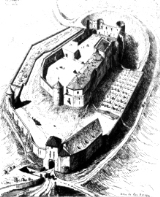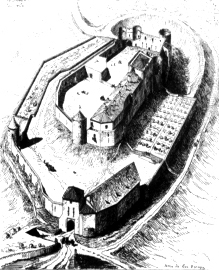
Jean III de Grailly, captal de Buch
Encyclopedia

Captal de Buch
Captal de Buch was an archaic feudal title in Gascony, captal from Latin capitalis "prime, chief" in the formula capitales domini or "principal lords." Buch was a strategically located town and port on the Atlantic, in the bay of Arcachon...
KG
Order of the Garter
The Most Noble Order of the Garter, founded in 1348, is the highest order of chivalry, or knighthood, existing in England. The order is dedicated to the image and arms of St...
(d. Paris
Paris
Paris is the capital and largest city in France, situated on the river Seine, in northern France, at the heart of the Île-de-France region...
, 7 September 1376), son of Jean II de Grailly, Captal de Buch, Vicomte de Benauges, and Blanch de Foix. Was a cousin of the Counts of Foix
Counts of Foix
The counts of Foix ruled the independent County of Foix, in what is now southern France, during the Middle Ages. Later they extended their power to almost the entire Pyrenees mountain range, moving their court to Pau, in Béarn, until eventually the last count of Foix acceded to the French throne as...
and a renowned military leader in the Hundred Years' War
Hundred Years' War
The Hundred Years' War was a series of separate wars waged from 1337 to 1453 by the House of Valois and the House of Plantagenet, also known as the House of Anjou, for the French throne, which had become vacant upon the extinction of the senior Capetian line of French kings...
who was praised by the chronicler Jean Froissart
Jean Froissart
Jean Froissart , often referred to in English as John Froissart, was one of the most important chroniclers of medieval France. For centuries, Froissart's Chronicles have been recognized as the chief expression of the chivalric revival of the 14th century Kingdom of England and France...
as an ideal of chivalry.
Attached to the English side in the conflict, he was made Count of Bigorre
Bigorre
Bigorre is region in southwest France, historically an independent county and later a French province, located in the upper watershed of the Adour, on the northern slopes of the Pyrenees, part of the larger region known as Gascony...
by Edward III of England
Edward III of England
Edward III was King of England from 1327 until his death and is noted for his military success. Restoring royal authority after the disastrous reign of his father, Edward II, Edward III went on to transform the Kingdom of England into one of the most formidable military powers in Europe...
, and was also a founder and the fourth Knight of the Garter in 1348. He played a decisive role as a cavalry leader under Edward, the Black Prince
Edward, the Black Prince
Edward of Woodstock, Prince of Wales, Duke of Cornwall, Prince of Aquitaine, KG was the eldest son of King Edward III of England and his wife Philippa of Hainault as well as father to King Richard II of England....
in the Battle of Poitiers
Battle of Poitiers (1356)
The Battle of Poitiers was fought between the Kingdoms of England and France on 19 September 1356 near Poitiers, resulting in the second of the three great English victories of the Hundred Years' War: Crécy, Poitiers, and Agincourt....
in 1356.
In 1364 he commanded the forces of Charles II of Navarre
Charles II of Navarre
Charles II , called "Charles the Bad", was King of Navarre 1349-1387 and Count of Évreux 1343-1387....
in Normandy, where he was defeated and captured by Bertrand du Guesclin
Bertrand du Guesclin
Bertrand du Guesclin , known as the Eagle of Brittany or the Black Dog of Brocéliande, was a Breton knight and French military commander during the Hundred Years' War. He was Constable of France from 1370 to his death...
at Cocherel
Battle of Cocherel
The Battle of Cocherel it fought on May 16, 1364 between the king of France and the forces of Charles II of Navarre, over the succession to the dukedom of Burgundy....
. After his release the following year, he defected to the French side and was made lord of Nemours
Nemours
Nemours is a commune in the Seine-et-Marne department in the Île-de-France region in north-central France.-Geography:Nemours is located on the Loing and its canal, c...
by Charles V of France
Charles V of France
Charles V , called the Wise, was King of France from 1364 to his death in 1380 and a member of the House of Valois...
. However, he soon re-established his loyalty to the English, and in 1367 he went to Spain
Spain
Spain , officially the Kingdom of Spain languages]] under the European Charter for Regional or Minority Languages. In each of these, Spain's official name is as follows:;;;;;;), is a country and member state of the European Union located in southwestern Europe on the Iberian Peninsula...
with the Black Prince, fighting at the Battle of Nájera. Here he again faced Bertrand du Guesclin, but this time it was du Guesclin who was captured, and the Captal
Captal
Captal , was a medieval feudal title in Gascony. According to Du Cange the designation captal was applied loosely to the more illustrious nobles of Aquitaine, counts, viscounts, etc., probably as capitales domini, principal lords, though he quotes more fanciful explanations.As an actual title the...
was put in charge of the prisoner. He was rewarded for his service by being made the Constable of Aquitaine
Aquitaine
Aquitaine , archaic Guyenne/Guienne , is one of the 27 regions of France, in the south-western part of metropolitan France, along the Atlantic Ocean and the Pyrenees mountain range on the border with Spain. It comprises the 5 departments of Dordogne, :Lot et Garonne, :Pyrénées-Atlantiques, Landes...
in 1371.
Again fighting for the English, he commanded an English relief force when the French attacked La Rochelle
La Rochelle
La Rochelle is a city in western France and a seaport on the Bay of Biscay, a part of the Atlantic Ocean. It is the capital of the Charente-Maritime department.The city is connected to the Île de Ré by a bridge completed on 19 May 1988...
in 1372. While attempting to lift the siege of Soubise
Soubise
Soubise can refer to:* Soubise sauce, a béchamel-based sauce containing strained or puréed onions* Soubise, a commune of the Charente-Maritime département, in France* Benjamin de Rohan, duc de Soubise , Huguenot leader...
his force was surprised by a French force led by Owain Lawgoch
Owain Lawgoch
Owain Lawgoch, , full name Owain ap Thomas ap Rhodri , was a Welsh soldier who served in Spain, France, Alsace and Switzerland. He led a Free Company fighting for the French against the English in the Hundred Years' War...
, a Welsh soldier of fortune in the French service. The Captal and Sir Thomas Percy
Thomas Percy, 1st Earl of Worcester
Thomas Percy, 1st Earl of Worcester, KG was an English medieval nobleman best known for taking part in the rebellion with his nephew Henry Percy, known as 'Harry Hotspur', and brother Northumberland .-Lineage:...
, seneschal of Poitou
Poitou
Poitou was a province of west-central France whose capital city was Poitiers.The region of Poitou was called Thifalia in the sixth century....
, were captured. The Captal spent the remainder of his life as a prisoner at the Temple
Temple (Paris)
The Temple was a medieval fortress in Paris, located in what is now the IIIe arrondissement. It was built by the Knights Templar from the 12th century, as their European headquarters. In the 13th century it replaced earlier works of the Vieille Temple in Le Marais...
in Paris
Paris
Paris is the capital and largest city in France, situated on the river Seine, in northern France, at the heart of the Île-de-France region...
because Charles V believed him too dangerous to ransom back to the English.
Froissart gives an account of the Captal de Buch's chivalry and courage at the time of the peasant uprising in 1358 called the Jacquerie
Jacquerie
The Jacquerie was a popular revolt in late medieval Europe by peasants that took place in northern France in the summer of 1358, during the Hundred Years' War. The revolt, which was violently suppressed after a few weeks of violence, centered in the Oise valley north of Paris...
(see link).
Since he left no heirs from his marriage to Rose d' Albret, his uncle, Archambaud, count of Foix and of Bigorre took the title Captal de Buch, which passed to his descendants the Counts of Foix.

